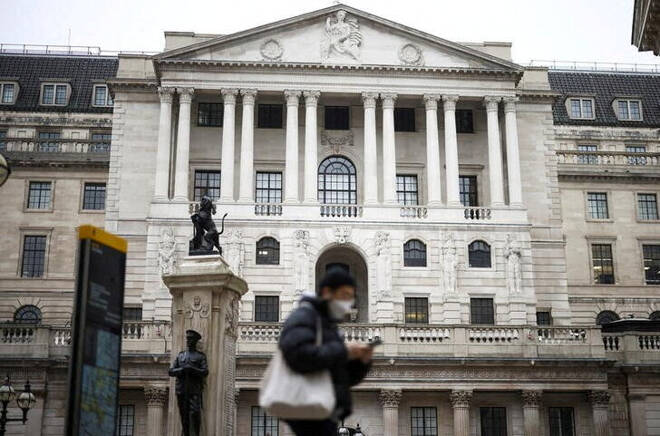Advertisement
Advertisement
BoE’s Pill sees no growth for UK economy, warns against big rate hikes
By:
LONDON (Reuters) - Bank of England chief economist Huw Pill said on Wednesday that he would be open to voting for a larger move in interest rates than the 0.25 percentage point steps favoured so far by the BoE, if economic circumstances warrant.
By Andy Bruce
LONDON (Reuters) -Bank of England chief economist Huw Pill warned on Wednesday that Britain’s economy would slow to a crawl over the next 12 months and repeated his preference for a “steady-handed” approach to raising interest rates.
With inflation heading towards double digits and growth in the economy fading fast, Pill said the BoE was trying to chart a narrow path between these two forces and get consumer price growth back to its 2% target.
International institutions, such as the International Monetary Fund and OECD, say Britain is more susceptible to recession and persistently high inflation than other Western countries grappling with global energy and commodity market shocks.
Political strife – with Prime Minister Boris Johnson reeling from the resignation of his health and finance ministers on Tuesday – has added to the sense of turmoil in Britain.
“We’re not expecting really to see any growth in the economy over the next year or so,” Pill told the audience after a speech at a conference hosted by King’s College London’s Qatar Centre for Global Banking & Finance.
Last month the BoE’s Monetary Policy Committee said it was ready to “if necessary act forcefully” to tackle inflation that is likely to exceed 11% later this year.
Pill said the line reflected his own willingness to step up the pace of tightening policy if data supported such moves, adding that his decision in August would depend on the economic news.
But for now, he stuck with his preferred “steady-handed” approach and warned that big moves in the central bank’s benchmark rate could be counterproductive.
“One-off bold moves can … be disturbing in terms of their impact on financial markets,” Pill said, answering audience questions.
The BoE should avoid gaining a reputation for “jerking around Bank Rate” in response to short-term economic news, Pill added, as investors would view this as noise that would disrupt the transmission of monetary policy.
The BoE has raised interest rates five times since December, raising rates to 1.25% from 0.1%.
The central bank has not raised interest rates by 0.5 percentage points in a single move since it gained operational independence in 1997, but financial markets see a 60% chance of such a move at the BoE’s next meeting in August.
Faster tightening is expected despite the fact that growth is losing momentum as the highest inflation in 40 years erodes households’ purchasing power.
Pill echoed comments from Deputy Governor Jon Cunliffe earlier on Wednesday that the BoE would do whatever it would take to prevent inflation becoming embedded, and that a slowing economy would take some of the heat off price pressures.
“Risks to the economic outlook are two-sided,” Pill said. “The current squeeze on real income … threatens to create slack and downside risks to inflation further out.”
Unlike the United States – where the Federal Reserve has signalled a rapid tightening path – Britain imported much more of its energy, leading to a drop in living standards when energy prices rose, Pill added.
(Reporting by Andy Bruce and David Milliken; Editing by Kate Holton, William James and Tomasz Janowski)
About the Author
Reuterscontributor
Reuters, the news and media division of Thomson Reuters, is the world’s largest international multimedia news provider reaching more than one billion people every day. Reuters provides trusted business, financial, national, and international news to professionals via Thomson Reuters desktops, the world's media organizations, and directly to consumers at Reuters.com and via Reuters TV. Learn more about Thomson Reuters products:
Did you find this article useful?
Latest news and analysis
Advertisement
